With the passing of the Jewish Nation-State Law, Israel has fundamentally redefined its relationship with its Palestinian minority. Now, Arab citizens are coming together to fight a law that entrenches their second-class status.
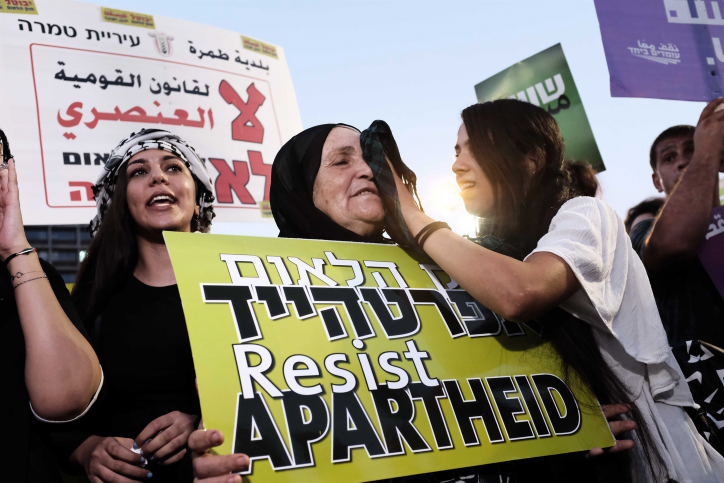
Tamer Nafar, the famed Palestinian rapper from the mixed Jewish-Arab city of Lyd, said he regrets not participating in the Arab-led protest against the Jewish Nation-State Law last Saturday. Yet he believes he would have regretted joining the demonstration just as much.
Nafar, one of the progenitors of the hip hop scene in the Middle East, has built his career crafting sharp, punching lines that describe the reality of Israel’s Palestinians. His hesitation reflects a larger sense of unpreparedness – but not surprise – from the full impact of the Jewish Nation-State Law, which enshrined a superior set of rights for Jewish Israelis last month, and the direction in which Prime Minister Benjamin Netanyahu’s right-wing government is headed.
“It’s scary. I have two kids, I don’t want them to suffer. The situation here is getting worse,” Nafar said.
Members of the Palestinian community in Israel launched a campaign to repeal the law — headed by the Higher Arab Monitoring Committee — an umbrella organization that represents the country’s Arabs, which make up 20 percent of Israel’s population. Tens of thousands of Palestinian citizens, together with Jewish supporters, demonstrated against the law in Tel Aviv’s Rabin Square over the weekend, a week after the Druze community held their own mass protest in the same square.
Now that the campaign is gaining momentum, the committee and its allies are getting to work. They plan to mobilize Arab communities, apply international pressure on Israel, and forge Jewish-Palestinian partnerships. That is, if they manage to overcome years of internal fragmentation.
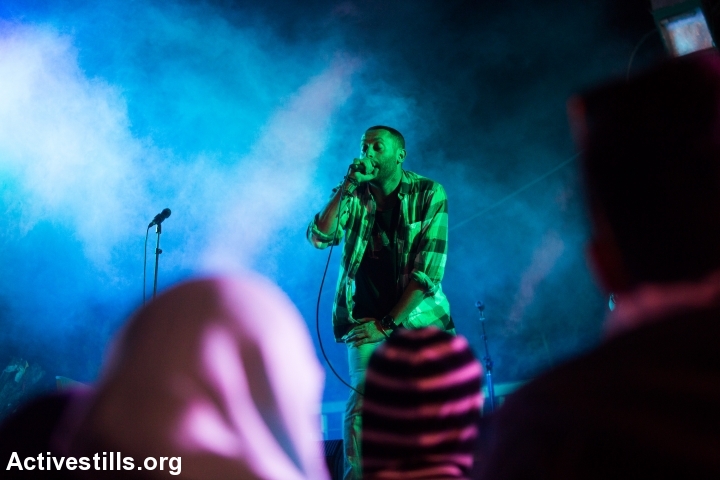
What many Palestinian citizens of Israel can agree on is that the impact of the Jewish Nation-State Law is not solely symbolic. “It doesn’t only change our relationship with the state on the ideological and legal levels – the law has real ramifications,” said Raghad Jaraisy, an attorney who directs the Arab Minority Rights Unit at the Association for Civil Rights in Israel (ACRI). The law can determine whether Arabs can live in ethnically mixed neighborhoods, whether Arab cities can expand, and whether Arab citizens would be able to speak their native language freely in public.
Jaraisy added that the law is likely to embolden many Jewish Israelis to unapologetically demand that Israel only represent them, entrenching “a stronger sense of entitlement, superiority and discrimination.”
As the state redefines its relationship with its Palestinian citizens, some have called on Arab members of the Knesset to resign. Zuheir Bahloul, an Arab legislator with the Zionist Union party, quit in late July, just days after the law was passed, claiming, “the law oppresses me and oppresses the population that sent me to the Knesset.”
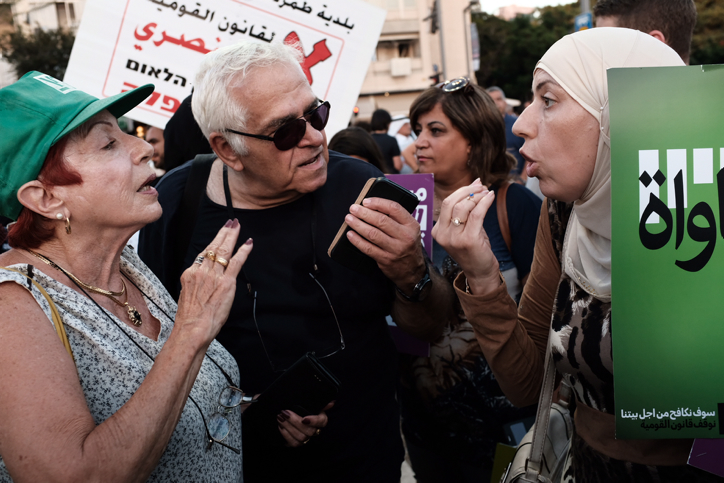
Jaraisy believes resignation is only one of many tools Palestinian citizens should consider, but the decision shouldn’t be “automatic.” After all, threats and intimidation aimed at the Arab minority have existed since Israel’s establishment. It might seem worse now, Jaraisy said, because discrimination against non-Jews is backed by the equivalent of a constitutional amendment. But there have been many contentious points throughout Israel’s history – such as the annexation of East Jerusalem, Land Day, and the October 2000 killings – in which Arab MKs could have resigned, but didn’t.
Several NGOs are planning to petition the law to Israel’s High Court, including ACRI. Adalah, The Legal Center for Arab Minority Rights, has already done so. “Perhaps it is better to wait and see what happens in court,” said Jaraisy. If the judges repeal the law, “then there’s no need for resignation. On the contrary, members of the Knesset become even more important in fighting against a new formulation of the law, for example.”
The Higher Arab Monitoring Committee is planning several follow-up actions in the spirit of Saturday’s protest. For the past 10 days, they have circulated a petition across Arab cities and villages to overturn the law, with the aim of reaching half a million signatures. It is also planning a mass procession from the north to Jerusalem.
Committee Chairman Muhammad Barakeh says the group is also discussing ways to maintain cooperation with the Jewish Israeli groups that joined Saturday’s march. “The protest was a political act, but it was also a social act and an attempt to build a different consciousness,” said Barakeh, referring to the convergence of more than 20 political parties, movements and organizations, including Israeli groups such as Peace Now and the Zionist Left Meretz party.
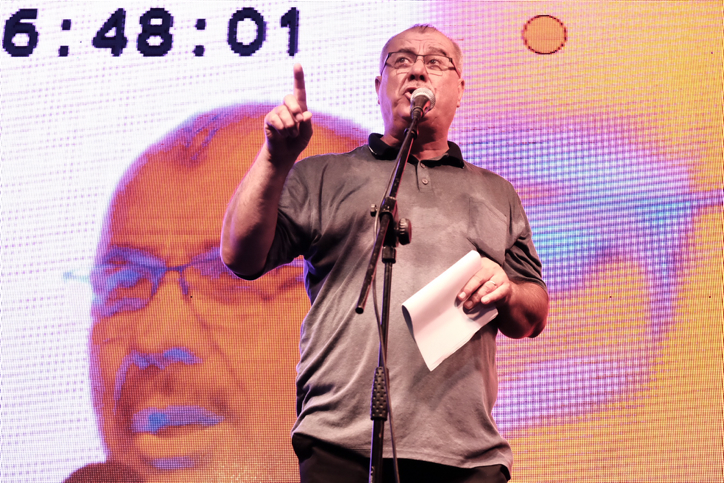
Historically, there is no precedent for mass Arab-Jewish protests in Tel Aviv. Leftist parties in Israel tend to cater to center-left voters, and perpetuate the depiction of Palestinian citizens of Israel as a domestic threat. “But the danger comes from Israel’s policies of occupation, siege, and discrimination,” said Barakeh.
Nafar can understand why the organizers, who sought a larger crowd, decided to cooperate with “the predominantly white, Zionist Left” to accomplish that. But this strategy, he said, is counterintuitive.
“I’m not sure how comfortable I am demonstrating side by side with the Left that founded this country. I’m not comfortable with the Zionist Left dictating what I’m allowed to say in protests, and what’s preferable or more strategic. We are the oppressed. This is our struggle.”
Although not an official demand, the Higher Arab Monitoring Committee asked that demonstrators not carry Palestinian flags at its action, a request that became a source of tension among Palestinian citizens, to the point that some were discouraged entirely from participating in the protest.
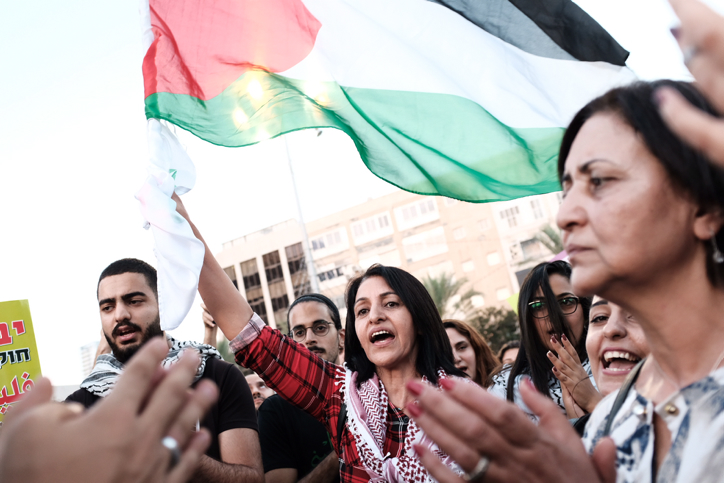
Others insisted on marching with flags, an incident that served as a convenient spin for Netanyahu, who depicted the peaceful protest as a looming threat to Israel and its Jewish population, going so far as to use the flags as a justification for the Jewish Nation-State Law itself. Several mainstream media outlets played along, running scaremongering headlines such as “Palestinian flags in the heart of Tel Aviv” on their front pages.
“I certainly don’t think that refraining from raising Palestinian flags helps change the narrative,” said Jaraisy. “Perhaps we can explain the meaning of the Palestinian flag. It’s similar to when Jews here see Jews in America raise the Israeli flag – they don’t question why Jewish Americans are raising the Israeli flag as American citizens.”
Jaraisy believes that building a broader coalition of groups who oppose the Jewish Nation-State Law is doomed to fail if Palestinians will have to hide their identity for Jewish Israelis to join the struggle. For Barakeh, however, debating these differences is only natural. “We have to remember: we’re not going for complete political alignment, we’re merely working toward a shared goal, which is to repeal the Nation-State Law.”
Barakeh added that the committee is also acting on the international level. Its members are slated to convene with the European Union’s Foreign Minister Federica Mogherini in the next few days. Discussions are also planned with the EU’s Human Rights Committee in Geneva as well as the United Nations.
The meetings with high-level officials could mark a shift in the way the world views Palestinian citizens of Israel. Whereas in the past, their turbulent relationship with the state was considered a domestic affair, now the international community is increasingly taking interest in their status as an ethnic and national minority.
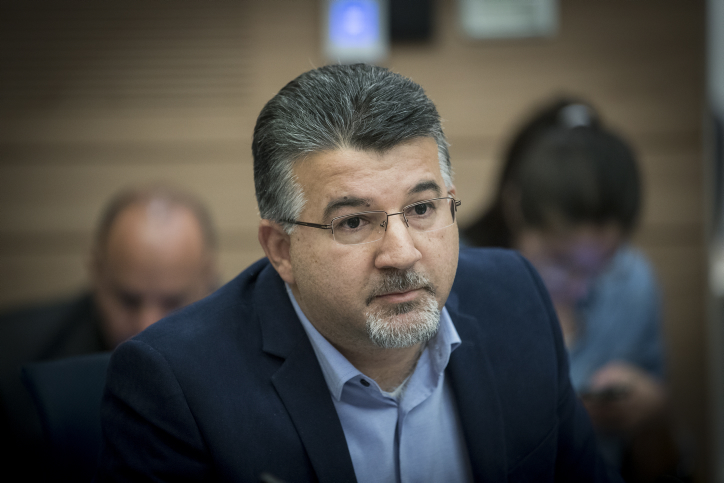
Jaraisy believes that the Arab-Palestinian community in Israel should take advantage of international pressure on Israel, which has worked in the past. For example, she said, when Israel joined the OECD, it realized that without investing in education in Arab communities, it wouldn’t be able to achieve a desired higher ranking. On Wednesday, MK Yousef Jabareen of the Joint List addressed the OECD’s General Secretary and warned that the law will widen the socio-economic gaps between Jewish and Arab citizens in Israel – a result that directly contradicts the organization’s recommendations.
Engaging with the international community doesn’t stop at institutions, as far as Nafar is concerned. For him, Palestinians share more in common with groups like Black Lives Matter than leftist parties in Israel. “I value cooperation with globally oppressed groups and with people who are aware of their privilege. If Trump and Bibi work together, there is no reason for those who oppose Trump and Bibi not to work together,” he said.
“My problem isn’t with the different strategies, but with Zionism, and that’s what I’d rather focus on.”

